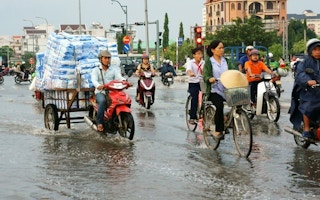The US government is setting up a course to train officials in the Asia-Pacific region in the basics of preparing and financing projects to help communities weather climate change, experts from the USAID development agency said on Friday.
Financing needs for climate change adaptation - efforts to adjust to extreme weather and rising seas - are estimated at tens of billions of dollars per year in developing countries.
But in 2013, only $25 billion in public resources went to adaptation around the world.
Rich countries have promised to mobilise an annual $100 billion by 2020 to help poor nations adapt to climate change and develop their economies on a low-carbon path.
“
It was clear that local-level officials want more information on basic climate science and adaptation measures before they can make the leap to project development.
Bikram Ghosh, deputy chief of Adapt Asia-Pacific
The key challenge is channelling money from large donors to small, poor communities that are hardest hit by climate-related disasters, experts said in an online discussion supported by the Asia Pacific Adaptation Network.
Most international funders cannot lend directly to smaller communities, and have to go through national agencies, such as finance ministries, said Peter King who works on USAID’s Bangkok-based Adapt Asia-Pacific project.
“Not only do (local authorities) have problems in implementing projects,” King said. “In our experience they have difficulty in designing projects too.”
King suggested embedding experts in local governments to provide technical assistance and on-the-job training. Adapt Asia-Pacific is developing an adaptation training course tailored to urban areas, he added.
The course has been piloted at the Bandung Institute of Technology in Indonesia, with 20 officials working on urban infrastructure and climate change, said Bikram Ghosh, deputy chief of Adapt Asia-Pacific.
“The training was well received - it was clear that local-level officials want more information on basic climate science and adaptation measures before they can make the leap to project development,” Ghosh said.
The course, which will be conducted through regional organisations and universities, is being fine-tuned and tested in the Philippines and again in Indonesia, before being rolled out by November, Ghosh told the online discussion.
King said it was also critical to have a roster of experts available to help design and implement adaptation projects.










